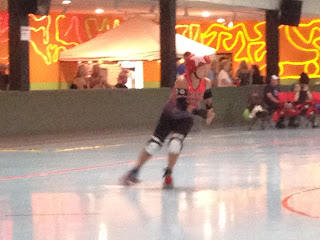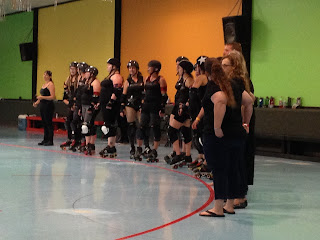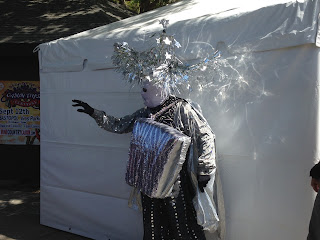Technically, I know the above photo does not qualify as a successful photo, but I really like how it looks, so it's the one you're getting. Well, and the one below, too.
The photos are from a recent performance by Parcivillian and, whereas I would love to talk about that performance and talk about the rehearsal session I sat in on (which was fascinating!), I need to finish up the interview. The part I skipped over. See, being a writer, I felt compelled to ask the guys about, well, what kinds of things they read. In relation to that, I found it really cool that the name of their band comes from a book (see
last week's post).
Me: The next question I'm going to ask is going to seem, possibly, weird or offtrack because it has nothing to do with music.
Elliot: How many pets do you have?
Me: No... [And that did make me laugh.] I'm a writer, and a lot of the people who follow my blog are writers, so, as a writer, do you read and what do you read?
Someone, at that point, said, "Oh, boy!" but I can'd tell who it was.
Me: Or have there been any influential books you have read? Even if it's like
The Monster at the End of the Book.
Delek: John Steinbeck is my all-time favorite writer. I've read every book he's written.
Me: What's your favorite Steinbeck?
Delek: Actually,
Cannery Row. Or, no... I always forget the name. The one about the pirate. That's my favorite one. [There followed a discussion where we (Delek, Elliot, and I) tried to figure out the book, but none of us could come up with which one he meant. I'm still not sure, because I haven't read whichever one it is.] Bukowski, too. I love Bukowski. [I redirected back to Steinbeck through some questions about Steinbeck's King Arthur stuff, so the next comments are about Steinbeck.] Mainly the things about California. And people. How he writes about people. His knowledge of what makes people human is probably what attracts me to his writing.... He's probably my all time favorite writer, but I've read countless books, and I'm still reading countless books. Some stuff in science, some in history. I just read this incredible biography about Benjamin Franklin. It's like music; I read a lot of stuff. I used to read a lot of fantasy.
Me: I went through high school reading fantasy.
Delek: Do you know David Eddings?
Me: Oh, yeah!
The Belgariad, after
The Lord of the Rings, I think is the best fantasy series ever written.
Elliot: I read that, too.
Delek: I liked that. I liked that actually better than
The Lord of the Rings. I liked his writing a lot.
[There was some more discussion about Eddings (during which I do entirely too much of the talking), after which Delek turned to Stav and said, "What do you read?"]
Stav: That's the weird thing; I actually don't read that much. And it's weird because I love writing lyrics to songs but, as far as books and novels, I just don't do it.
Me: They're completely different beasts.
Stav: Yeah, that's right. I did read the Harry Potter books when I was a kid, of course. Those, I loved. They were great. Read books for school. But I'm a very slow reader so, as far as school goes, I kind of struggled through the books, so that's kind of where I'm at. But I love poetry, even though I don't know many huge poets. In school, I loved analyzing and studying the poems. As far as literature, I love poetry, and that's what I try to do when I write songs.
Me: As a song writer, I'd be surprised if you didn't have some kind of attachment to poetry.
[There was a bit more general talk of poetry before we moved on to Elliot.]
Elliot: My all time favorite book is
The Pastures of Heaven by Steinbeck.
Me: I haven't read that one.
Delek: That one's amazing.
Elliot: It is. It's the most incredible perspective I've ever seen on the human being. [There's some discussion about Pastures and what it's about.]
Me: Y'all are going to make me have to pick back up on Steinbeck after this.
Elliot: Lately, I've gotten into more novels. Actually, this is a funny story [points at Delek]; he taught me how to read.
Me: Yeah? That's cool!
Elliot: He gave me the first Harry Potter book and worked through about the first chapter with me, I think, and said, "You're on your own." Then I read the whole thing.
Delek: That is a funny story.
Elliot: Yeah... I got into David Eddings. I got into Neil Gaiman and Terry Pratchett...
Delek: Yeah!
Me:
Good Omens.
Elliot: Exactly. [There followed a back and forth discussion of Gaiman and Pratchett.] Somewhere after eighth grade, I got really into Shakespeare, including the poetry. I love that stuff. [Then, there was a discussion of
Hamlet.]
Interestingly enough, this all moved into a discussion of the book
Parzival, which is the book they took they name from (which you know if you read last week's post (link above)), but they didn't mention the connection at that point. They (Elliot and Delek) just went on and on about how good it is. Stav will have to read it this year, so he hasn't had that experience of it, yet.
Elliot: Of course, I've read
The Hobbit and
The Lord of the Rings. Actually, I like
The Hobbit better. I've read [it] three times.
There was some other discussion about
The Hobbit during which I talked way too much, and that's where we left the discussion of reading and went back to music. It was great for me to talk to them about what they've read and what's influenced them, and, really, I may have to pick Steinbeck up again. It's actually something I've been meaning to do anyway, so...
And that's a look inside an up and coming band. I hope great things for these guys. They're music is great, and they were a pleasure to meet and hang out with. I'm sure you'll hear a bit more about them from me in the future. They have a concert coming up, so it's not too unlikely that there will be a post about that. Until, then, check out "
Lonely Road."


























